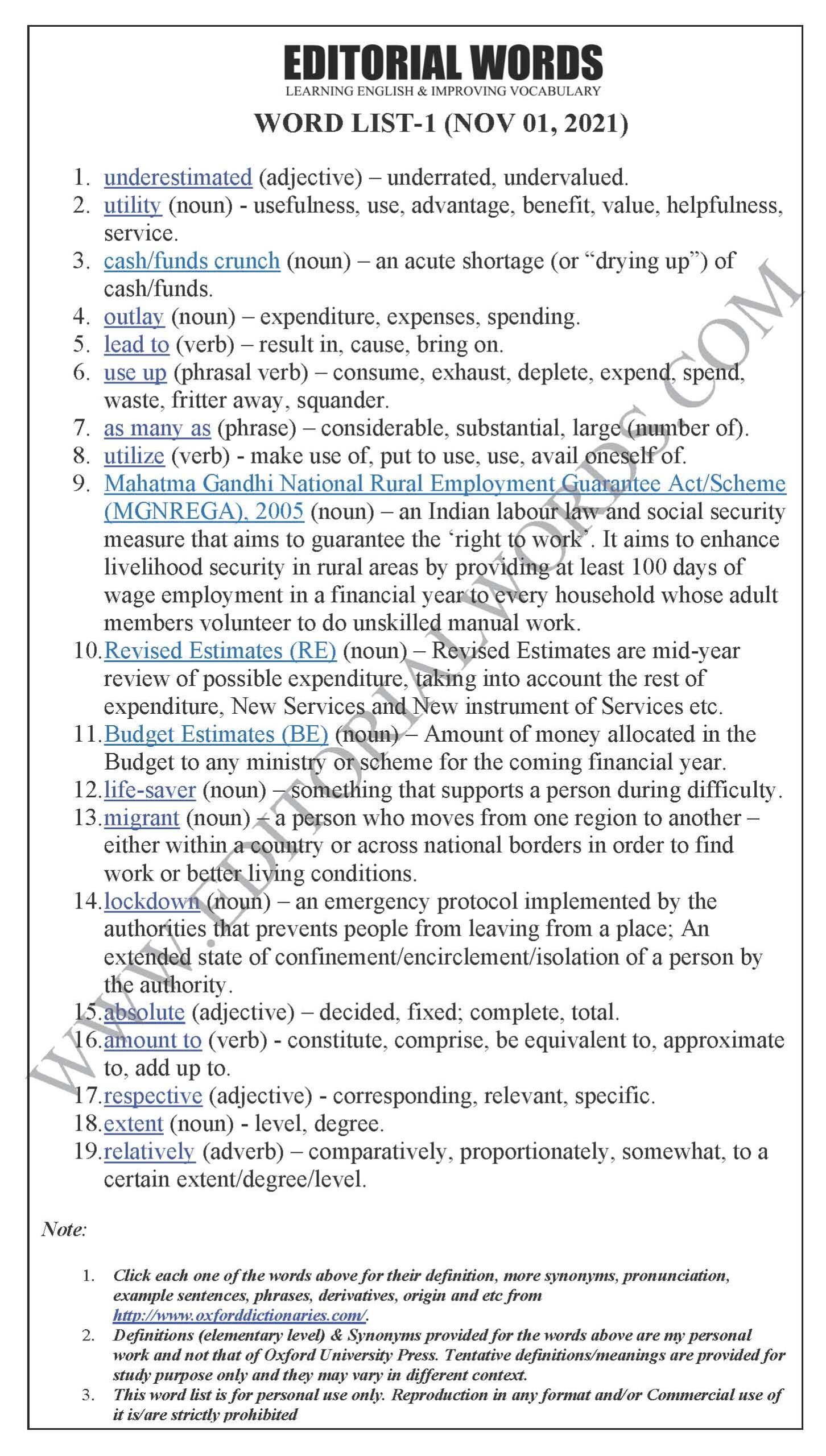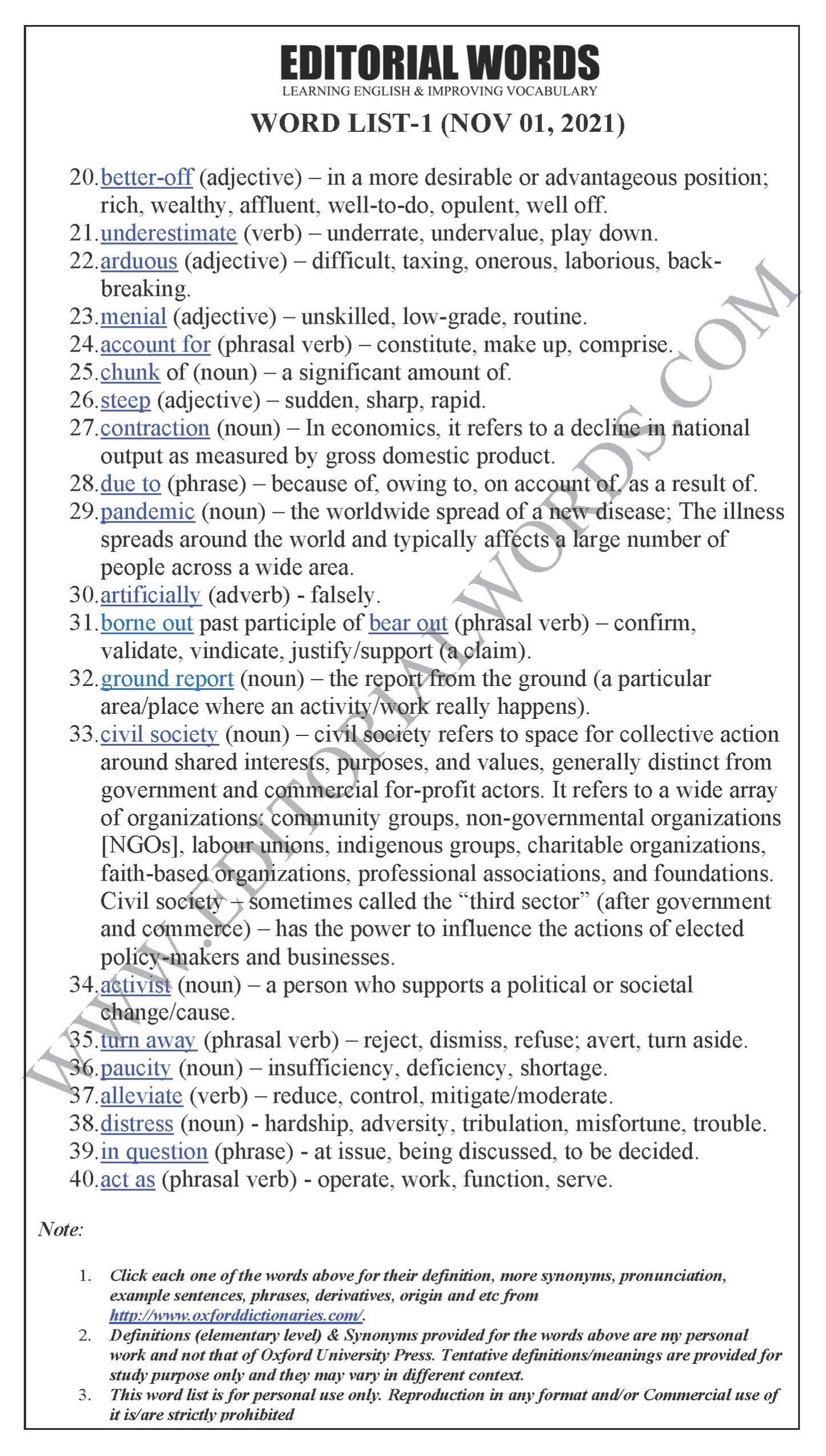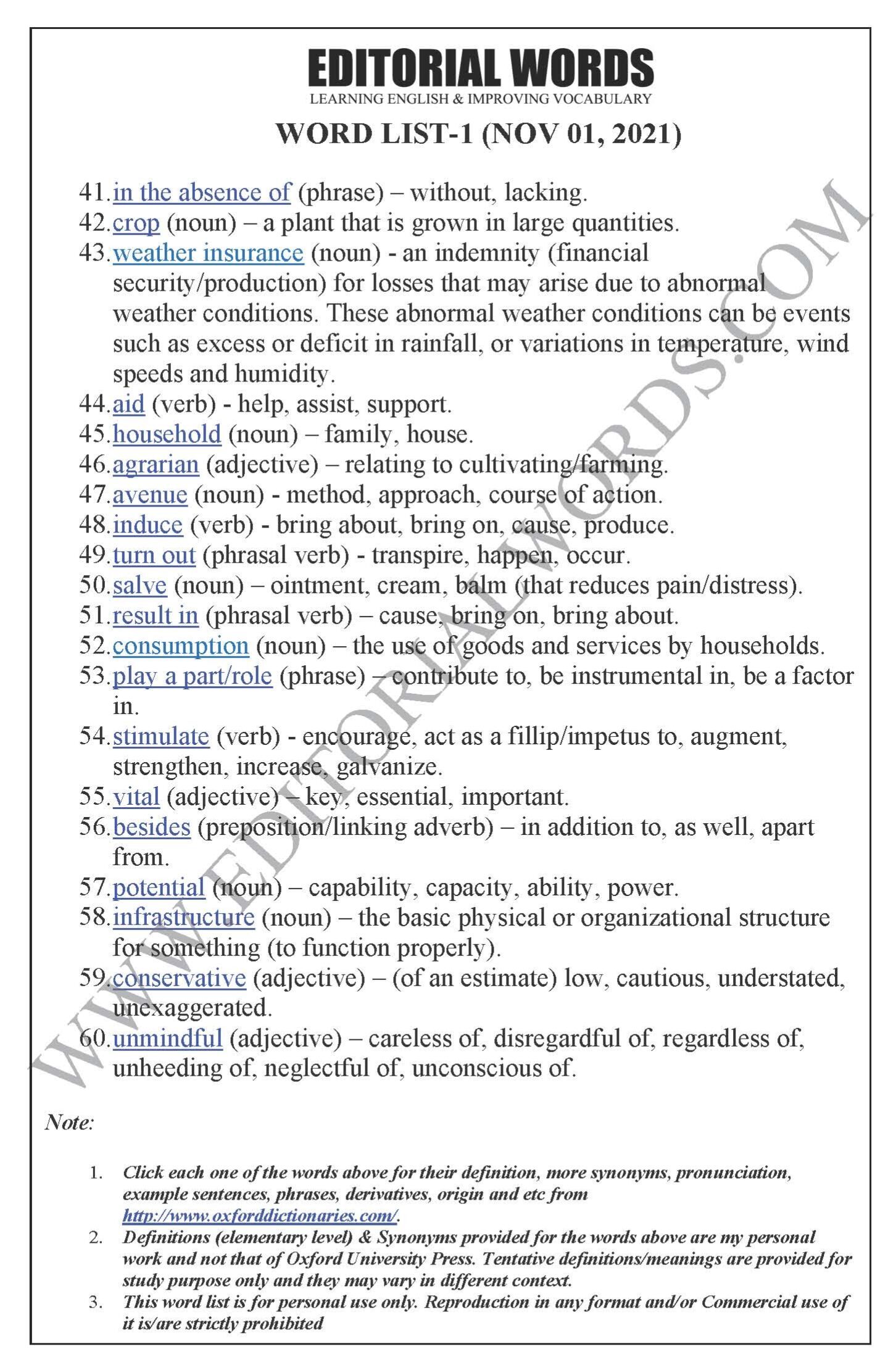The Hindu Editorial (Underestimated utility) – Nov 01, 2021
That as many as 21 of 35 States/UTs have utilised, by October 29, over 100% of their allocated funds under the Mahatma Gandhi Rural Employment Guarantee Scheme (MGNREGS) for FY2021-22 is not a surprise. For further reading, visit “The Hindu”. Below is today’s word list-1 for The Hindu Editorial (Underestimated utility) – Nov 01, 2021.
To read this article, click “The Hindu”.
This preview is provided here with permission.
Courtesy: The Hindu
The Hindu Editorial (Underestimated utility) – Nov 01, 2021:
- underestimated (adjective) – underrated, undervalued.
- utility (noun) – usefulness, use, advantage, benefit, value, helpfulness, service.
- cash/funds crunch (noun) – an acute shortage (or “drying up”
) of cash/funds. - outlay (noun) – expenditure, expenses, spending.
- lead to (verb) – result in, cause, bring on.
- use up (phrasal verb) – consume, exhaust, deplete, expend, spend, waste, fritter away, squander.
- as many as (phrase) – considerable, substantial, large (number of).
- utilize (verb) – make use of, put to use, use, avail oneself of.
- Mahatma Gandhi National Rural Employment Guarantee Act/Scheme (MGNREGA), 2005 (noun) – an Indian labour law and social security measure that aims to guarantee the ‘right to work’. It aims to enhance livelihood security in rural areas by providing at least 100 days of wage employment in a financial year to every household whose adult members volunteer to do unskilled manual work.
- Revised Estimates (RE) (noun) – Revised Estimates are mid-year review of possible expenditure, taking into account the rest of expenditure, New Services and New instrument of Services etc.
- Budget Estimates (BE) (noun) – Amount of money allocated in the Budget to any ministry or scheme for the coming financial year.
- life-saver (noun) – something that supports a person during difficulty.
- migrant (noun) – a person who moves from one region to another – either within a country or across national borders in order to find work or better living conditions.
- lockdown (noun) – an emergency protocol implemented by the authorities that prevents people from leaving from a place; An extended state of confinement/encirclement/isolation of a person by the authority.
- absolute (adjective) – decided, fixed; complete, total.
- amount to (verb) – constitute, comprise, be equivalent to, approximate to, add up to.
- respective (adjective) – corresponding, relevant, specific.
- extent (noun) – level, degree.
- relatively (adverb) – comparatively, proportionately, somewhat, to a certain extent/degree/level.
- better-off (adjective) – in a more desirable or advantageous position; rich, wealthy, affluent, well-to-do, opulent, well off.
- underestimate (verb) – underrate, undervalue, play down.
- arduous (adjective) – difficult, taxing, onerous, laborious, back-breaking.
- menial (adjective) – unskilled, low-grade, routine.
- account for (phrasal verb) – constitute, make up, comprise.
- chunk of (noun) – a significant amount of.
- steep (adjective) – sudden, sharp, rapid.
- contraction (noun) – In economics, it refers to a decline in national output as measured by gross domestic product.
- due to (phrase) – because of, owing to, on account of, as a result of.
- pandemic (noun) – the worldwide spread of a new disease; The illness spreads around the world and typically affects a large number of people across a wide area.
- artificially (adverb) – falsely.
- borne out past participle of bear out (phrasal verb) – confirm, validate, vindicate, justify/support (a claim).
- ground report (noun) – the report from the ground (a particular area/place where an activity/work really happens).
- civil society (noun) – civil society refers to space for collective action around shared interests, purposes, and values, generally distinct from government and commercial for-profit actors. It refers to a wide array of organizations: community groups, non-governmental organizations [NGOs], labour unions, indigenous groups, charitable organizations, faith-based organizations, professional associations, and foundations. Civil society – sometimes called the “third sector” (after government and commerce) – has the power to influence the actions of elected policy-makers and businesses.
- activist (noun) – a person who supports a political or societal change/cause.
- turn away (phrasal verb) – reject, dismiss, refuse; avert, turn aside.
- paucity (noun) – insufficiency, deficiency, shortage.
- alleviate (verb) – reduce, control, mitigate/moderate.
- distress (noun) – hardship, adversity, tribulation, misfortune, trouble.
- in question (phrase) – at issue, being discussed, to be decided.
- act as (phrasal verb) – operate, work, function, serve.
- in the absence of (phrase) – without, lacking.
- crop (noun) – a plant that is grown in large quantities.
- weather insurance (noun) – an indemnity (financial security/production) for losses that may arise due to abnormal weather conditions. These abnormal weather conditions can be events such as excess or deficit in rainfall, or variations in temperature, wind speeds and humidity.
- aid (verb) – help, assist, support.
- household (noun) – family, house.
- agrarian (adjective) – relating to cultivating/farming.
- avenue (noun) – method, approach, course of action.
- induce (verb) – bring about, bring on, cause, produce.
- turn out (phrasal verb) – transpire, happen, occur.
- salve (noun) – ointment, cream, balm (that reduces pain/distress).
- result in (phrasal verb) – cause, bring on, bring about.
- consumption (noun) – the use of goods and services by households.
- play a part/role (phrase) – contribute to, be instrumental in, be a factor in.
- stimulate (verb) – encourage, act as a fillip/impetus to, augment, strengthen, increase, galvanize.
- vital (adjective) – key, essential, important.
- besides (preposition/linking adverb) – in addition to, as well, apart from.
- potential (noun) – capability, capacity, ability, power.
- infrastructure (noun) – the basic physical or organizational structure for something (to function properly).
- conservative (adjective) – (of an estimate) low, cautious, understated, unexaggerated.
- unmindful (adjective) – careless of, disregardful of, regardless of, unheeding of, neglectful of, unconscious of.
Note:
1. Click each one of the words above for their definition, more synonyms, pronunciation, example sentences, phrases, derivatives, origin and etc from http://www.oxforddictionaries.com/.
2. Definitions (elementary level) & Synonyms provided for the words above are my personal work and not that of Oxford University Press. Tentative definitions/meanings are provided for study purpose only and they may vary in a different context.
3. This word list is for personal use only. Reproduction in any format and/or Commercial use of it is/are strictly prohibited.
The Hindu Editorial (Underestimated utility) – Nov 01, 2021:



“Phrasal Verbs” We Learnt Last Week
“Idioms & Phrases” We Learnt Last Week
“Important Definitions” We Learnt Last Week
Recent Word Lists For The Hindu Editorial Articles

Be the first to comment